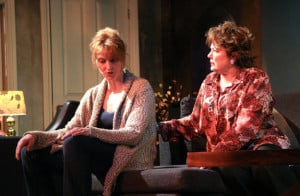BLAIR WOYNARSKI
Arts Writer
Rabbit Hole does not take you to Wonderland.
 Instead, it takes you to that unsettlingly familiar place where families clash and splinter, where people wonder if they really have any idea where their lives are taking them. Persephone Theatre’s latest mainstage takes a visceral look at suburban tragedy and portrays it with ferocity and wit.
Instead, it takes you to that unsettlingly familiar place where families clash and splinter, where people wonder if they really have any idea where their lives are taking them. Persephone Theatre’s latest mainstage takes a visceral look at suburban tragedy and portrays it with ferocity and wit.
The action centres on Becca and Howie, a couple in their late 30s whose son Danny died in an accident eight months earlier. Their relationship has broken down, and Howie struggles to understand Becca as she refuses to attend their support group and talks about selling their house — leading Howie to accuse her of trying to erase Danny.
Meanwhile, Becca’s irresponsible and much younger sister Izzy winds up pregnant, complicating Becca’s feelings; she suddenly faced with the arrival of a new child while still reeling from the loss of her own. Her overbearing mother also stops by to offer unwelcome advice of how best Becca should grieve. And to top it all off, the family hears from Jason, — the teenage boy who ran over Danny — as he attempts to make amends.
Before the show began, Will Brooks, Persephone’s youth program director called Rabbit Hole “one of the best pieces of contemporary theatre out there today.
Such tall praise sparked my interest. While I am not comfortable endorsing Mr. Brooks’s claim, I do have to say that David Lindsay-Abaire’s script is one of the most honest depictions of modern family life I have seen.
The set for this show was as much a character as all the fleshy bipeds trotting around onstage. Jim Guedo’s set design went for comprehensive realism, with Becca and Howie’s home very convincingly filling out the stage. In addition to Guedo’s vision, the production employed a set decoration designer who did up the whole stage in earth-toned upper middle class chic.
The stage employs two levels, with a staircase leading to Danny’s room, still decorated in robot bedsheets, storybooks and toys. Though it is used sparingly in the play, the bedroom’s presence constantly hangs over the heads of the characters.
The dialogue is frank without being vulgar and witty without being insouciant. Although they crack a few jokes, it never feels as if they’ve forgotten the tragedy hanging over them. And as easy as it would be, given the subject matter, the characters never slip into self-referential “confession time” speeches. The problem is that he tries so hard to avoid exposition that for the first couple scenes, the viewers are drowning in a sea of cryptic references, and when the characters finally get around to revealing something, it feels like a wink to the audience.
Patricia Drake dominates the action as Becca, offering a deeply pained but brave performance. She was also the only member of the cast to really settle into the set. The other actors never seem quite comfortable in their surroundings.
Tom O’Hara is solid as the frustrated Howie, having fiery collisions with Drake. He keeps a strong stage presence, though sometimes lacks intimacy.
Maralyn Ryan is also delightful as the busybody matriarch of the family.
Amy Matysio steals the spotlight as Izzy. She’s exuberant and sassy, and though her performance is underscored by longing, she always lifts the mood of her scenes. But she has the unfortunate tendency of turning dramatically toward the audience after saying something noteworthy. And while not a fault of her acting, her character arc is left somewhat incomplete. There is a hint of resentment toward her from Becca for having her own child, but it never amounts to anything.
The whole production is helmed by Jim Guedo, a well-respected director across the country and currently serving as the head of the drama department at the U of S. Characters are dragged through tragic circumstance, but instead of being able to pull together, they break apart, all haunted by the ghoulish spectre of social propriety. Most of the play is uncomfortable to watch, but it is also oddly uplifting.
I cannot speak to how accurate it is in depicting its central tragedy, but I think Rabbit Hole is relatable to anyone. It is a fearless play. You will follow the March Hare down into the pit, find yourself lost, confused and frightened. But you will re-emerge in the end, with a greater appreciation of the world you left.
– –
Leave a Reply